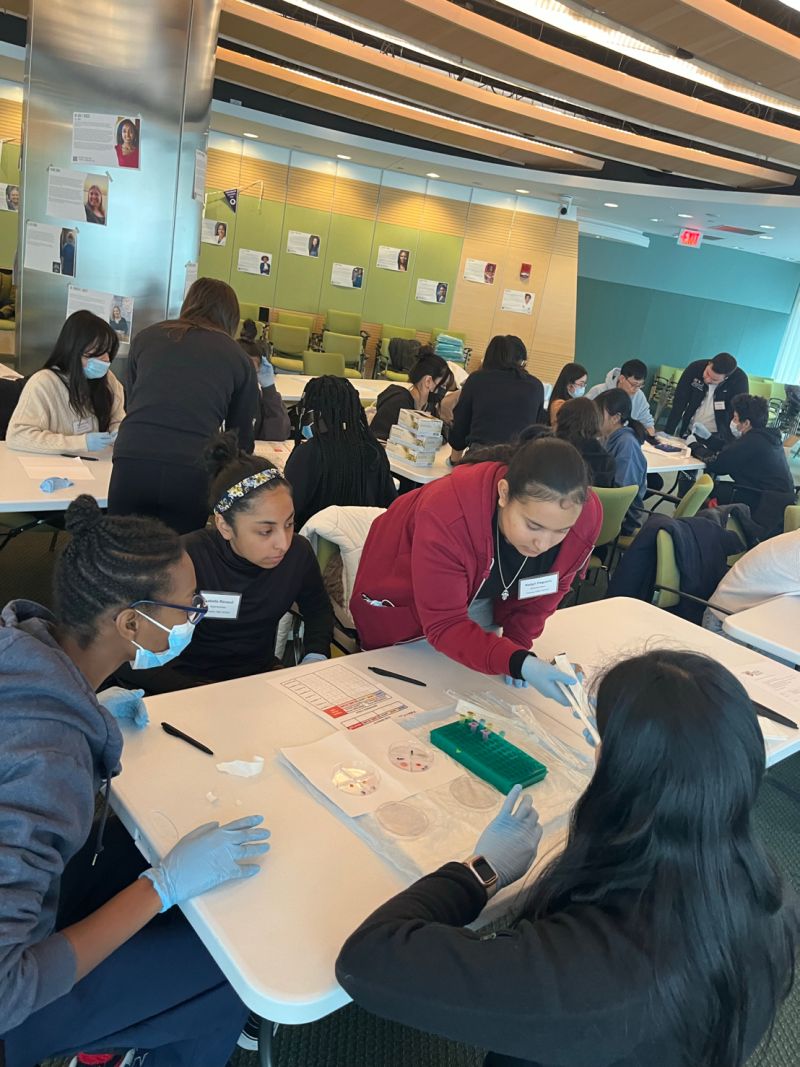
Students learn about STEM fields and research during a PRISM Science Club session
The programs, such as the PRISM Science Club, expose students from backgrounds underrepresented in STEM fields and research
HST
Launched in 2022, the PRISM Science Club, a joint effort between the Ragon Institute of Mass General Hospital (MGH), MIT, and Harvard; the Institute for Medical Engineering and Science (IMES) at MIT, and the Harvard-MIT Program in Health Sciences and Technology (HST)—housed at IMES—provides opportunities for high school students from backgrounds underrepresented in STEM in the Greater Boston area. Students from Boston, Cambridge, Brockton, Chelsea, and Revere, have participated, and are learning about cutting-edge medical science and careers in STEM-related fields.
The club is facilitated by graduate students from IMES/HST, meeting on Saturdays in March and April, and features a different program every week as well as a talk, discussion, and a related activity.
Don Pinkerton, the director of education and outreach at Ragon, says the second year has been a “hugely successful program launch” with help from HST graduate students and program facilitators Constantine Tzouanas, Sayo Eweje, Ami Thakrar, Gari Eberly, Xining Gao, and Mark Olchanyi.
“By creating this program, we’ve been able to introduce high school students to fields of STEM that normally aren’t covered in high school classes and to share the possibilities of the IMES/HST communities,” Tzouanas, an HST Medical Engineering and Medical Physics (MEMP) student, says. “Each of us had our own scientific mentors who helped us get our start, and it’s rewarding to pay it forward and even hear from past PRISM students going on to college about how the program shaped what they’re choosing to study.”
Pinkerton says that this year’s program was kicked off by Ragon Director Bruce Walker, MD, Professor of the Practice at IMES and the Phillip T. and Susan M. Ragon Professor of Medicine, Harvard Medical School. The program has also included a talk about transfusion medicine, blood typing, and killer T-cells from physician-scientist Wildredo Garcia Beltran, MD, PhD, a principal investigator at the Ragon; as well as a gene editing session, with a talk from Eweje, an HST MD and PhD student, and a CRISPR lab. Pinkerton says that “spending the day with 24 Boston-area high school scientists reminded me of what I love best about being an educator: being inspired by young people.”
“MIT and IMES has so much to offer the greater Boston community, and programs like PRISM are just one part of fulfilling our obligation to the people and communities that enrich our campus in so many ways,” Eweje says. “Through PRISM, we have the privilege of opening doors to people, resources, and career paths for our students which may have been more challenging to access otherwise.”
According to Tzouanas, many others in the HST/IMES community have led PRISM sessions, including:
- A session on cardiac pathophysiology and medical device development with Kimberly Lamberti and Connor Verheyen, both HST MEMP PhD students, and Manisha Singh, of the Therapeutic Technology Design and Development (TTDD) Lab
- A session on machine learning, big data, and genomics, led by Tzouanas
- A session on neurophysiology led by Mark Olchanyi, an HST MEMP PhD
Participation by HST students is facilitated by the HST Joint Council’s Public Service Chairs. PRISM Chairs specifically lead ongoing high school outreach programs that bridge IMES and the Ragon Institute, connecting high schoolers to the diverse fields of labs across IMES and Ragon, and helping inform students’ paths in college and beyond.
In addition to the PRISM program involvement, public service chairs are responsible for running a wide variety of service activities, such as volunteering at the Boston Marathon, helping at the Boston Food Bank, and hosting a CPR instructional course. For instance, Davy Deng, an HST MEMP student and public service chair, has led several student volunteer efforts, including volunteer days at the Boston Rescue Mission and upcoming days at St. Francis House.
Public Service Chairs have also initiated, led, and run other high school outreach programs in order to capture students’ interest in fields to which they might not otherwise have been exposed, and to connect high schoolers with the possibilities and opportunities of the Harvard/MIT communities. For example:
- In 2020, Public Service Chairs led virtual short courses focused on the immunology underlying COVID-19 and career paths involved in the pandemic response, reaching about 300 high school students from under-resourced or underrepresented backgrounds in Boston and around the world (USA, Europe, South Africa). Events included: 1) lectures on biological mechanisms of COVID-19 and treatments/vaccines, 2) clinical case studies with front-line critical care physicians that simulated the experience of doctors treating an unknown disease, 3) life/career advice interviews with professionals across public policy (e.g., member of the Presidential COVID-19 Advisory Group), scientific journalism (e.g., reporter from the New York Times), therapeutic development (e.g., executive responsible for development of the first antiviral approved to treat SARS-CoV-2), global health and social factors underlying health disparities (e.g., COVID-19 advisor to the Malawi Ministry of Health), and more.
Thakrar, an HST MEMP PhD student, says that participation in the PRISM Science Club, has been inspiring, and that “working with the IMES and HST communites to craft outreach initiatives that bring MIT science to the public has been extraordinarily rewarding. It’s been a special experience watching the students develop confidence in themselves with each passing week, and a joy to see how we can play a role in developing the next generation of biomedical scientists.”